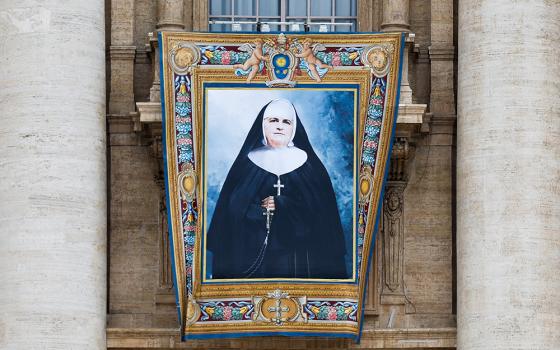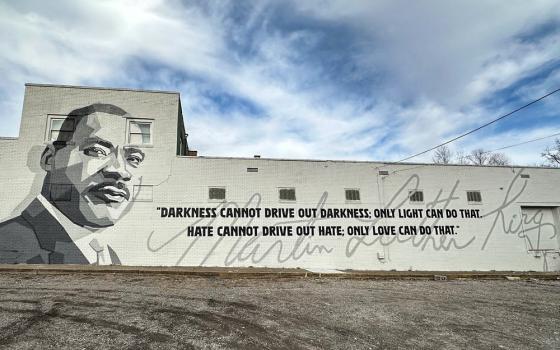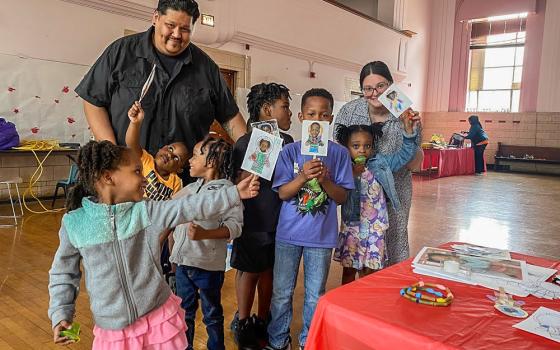
Basilian Sisters in Ukraine share bread they baked together. The author compares intercultural life in women's religious communities to the process of baking bread as ingredients come together in their diversity. (Courtesy of Yeremiya Steblyna)
It has been 30 years since Ukraine emerged from the oppression of the Soviet Union. Along with great cultural poverty, that oppression had brought a sense of collectivism and indifferent uniformity into the lives of communities, families and people in their workplaces. Over the past 30 years, Ukrainian society has gradually moved away from these structures. Monastic communities, which are also part of society, are experiencing a transformation in understanding and accepting diversity and seeing the need for unity.
The Basilian Sisters in Ukraine are discovering the concept of interculturality. After all, first and foremost, we are an international community, and we know that interculturality is the future for international communities of consecrated life. However, when we talk about interculturality, it also includes those who work with "others" outside the community.
At the initiative of the general administration of the Sisters of the Order of St. Basil the Great — particularly Sr. Marcela Runcan — the Intercultural Commission was established two years ago. The commission aims to "raise awareness of interculturality among the Basilian Sisters through the creation of motivational videos, writing articles, conducting interviews, and using other creative means that could help us appreciate our diversity more (not only between our provinces but also within them) and encourage us to live this unity more actively and consciously."
The commission consists of six sisters from different countries and provinces. It is my honor to serve on this commission, learning about diversity, including being involved in the publication of the newsletter in five languages. The commission's activities are evolving, and new projects are emerging to promote the ideas of interculturality. Each member has her own area of responsibility. However, each member is responsible for conducting intercultural training for the sisters in her own province. The purpose of these meetings is to make the concept of interculturality closer to us and to enhance intercultural sensitivity. Such meetings have already taken place in America, Argentina, Romania and Slovakia.
The sisters from Ukraine had the experience of such a two-day training this spring. In May, we went together to the Carpathian Mountains to be with one another and to discover the concept of interculturality.

Basilian sisters from Ukraine participated in a two-day training on interculturality in May. The sisters visited the Carpathian Mountains to spend time together and learn about the concept. (Courtesy of Yeremiya Steblyna)
For many sisters, this was quite an unexpected topic. Most of them thought it meant that they would be taught and prepared for service in another province or another country. Let's agree, what could one think of first, upon hearing the word "interculturality"?
However — first and foremost — we talked about what culture is and what it can be. We realized that there is an external culture, but the internal culture is much stronger, more resilient and harder to change. We learned how to understand ourselves and our own inner culture, in order to understand and respect another person's culture. And this means affirming their identity and recognizing their dignity.
In the community, intercultural life is not natural, but possible. It is supernatural, based on faith. Living in interculturality is challenging, but it's desirable and extremely necessary.
To cultivate intercultural thinking, we looked at Jesus together as someone who transcended all cultural boundaries. He became an example for us to accept the "other" in their complete otherness.
Advertisement
Intercultural life in our communities can be compared to the process of baking bread. Different ingredients come together successfully in their diversity, and the bread becomes a gift for everyone in the community. We attempted to knead and bake bread together as a symbol of unity. We discovered during these days that interculturality is our unity in the diversity of all our gifts.
One of the things that made a great impression on me was the testimony of a sister who summarized what she got out of her participation in the intercultural gathering. She said:
Jesus healed our perception of interculturality during these days. I used to think that interculturality and the interculturality committee were about making efforts to prepare sisters for work in another country. Instead, I discovered God in this topic, a God who wants to help me embrace the otherness of each person I live with and serve alongside. Through these conferences, I encountered Jesus. In his time, he consistently made efforts to be intercultural in his ministry, accepting individuals beyond religious, mental, social, or cultural limitations. Jesus continues to serve in this way through the bodies and hearts of people who open themselves to His will. These conferences have also given me great hope that my efforts here in Zaporizhzhia, although often weak and imperfect, are not in vain. I want to dedicate my life to bringing people to the Holy Sacraments. For this, I need a theology of interculturality that Jesus teaches me.








